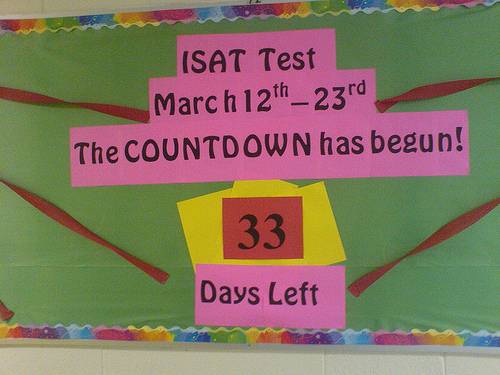
Political scientist Hannah Arendt was right about the banality of evil. Certainly, if ever an educational evil was perpetuated on children, the current standardized testing system is one of them, and yet here in Illinois we are strangely silent. Just like the famous studies that show how quickly people fall into complicit behavior patterns characterized by concern with details, bureaucracy, and following orders, Illinoisans mutter under breath about all the ill-effects of testing, but don’t do anything about it. In this way, the status quo is ensured, the big picture is obscured, and people don’t really have to face up to the existence, or their contributions to, this evil.
So we go along with the daily grind and begrudgingly accept the fact that Champaign-Urbana public school students will be taking the ISAT tests next week. This week, there are ISAT pep-rallies, test-prep cram sessions, and notes and calls to parents to emphasize adequate sleep and positive attitudes. However, for any citizen who has thought beyond the most superficial aspects of testing, it is truly difficult to maintain any semblance of a positive attitude.
Why? The emphasis on testing, especially in the poorer public schools, has virtually eliminated student-centered and active learning, and drastically reduced the amount of time teachers can teach history, science, geography, art, music, and physical education (including recess), among other ills. Just the fact that my fifth-grade son has spent two hours a week since the beginning of the school year on explicit test-prep activities, not counting the test-prep aligned curriculum and homework, should make parents ill at ease. Think of what they could be doing with that time! This isn’t to say that learning to take a test is a bad thing: it isn’t. What is bad is the inordinate amount of time and emphasis on these skill over other skills, such as finding the country of Iraq on a map of the world.
Moreover, the emphasis on testing hasn’t produced the results that No Child Left Behind (NCLB) proponents hoped for. Alternative tests have showed little or no progress under NCLB mandates:

Yes, there are some small gains, but again and again over past years the numbers come up short, because, as NCLB critics have said all along, test scores correspond to socio-economic status, not the effectiveness of a particular school: poorer kids score lower, no matter the quality of teaching. Even when a district proclaims success, it can sometimes come at the expense of the standards themselves, which vary from state to state and are constantly being lowered in states that aren’t making the grade.
What are the results of this madness? Well, for starters, kids (especially African-American kids), are dropping out of school at a more frequent rate than in the past. Just ask Unit 4, here in Champaign, about Central High School’s dropout rate (although you might not get a straight answer). In states like Texas, for example, some districts actually encourage low test-scorers to leave the system.
The emphasis on testing also results in the loss of great teachers, who flee a system that rewards conformity and teaching to the test and punishes those who champion active, hands-on learning strategies and critical thinking skills. Many times, those creative teachers end up at the kind of private schools President Obama’s daughters attend, leaving the rest of us in “fill-in-the-bubble” hell.
So why are we so silent here in Illinois? Why haven’t we challenged this state of affairs like other states have? Who really benefits from this standardized testing arrangement? Why won’t we stop focusing on the more minor details of this mandate and see the bigger picture?
Ever since my children entered public schools, I have asked myself these questions. I have contacted politicians, board members, administrators, and teachers. I have organized forums and parent groups, attended meetings with officials, written columns, broadcast my opinions on the radio, and participated in strategic planning sessions for Unit 4.
I’m getting tired of it all, actually. The banality of evil is relentless and powerful. There are other issues that concern me, other successes to celebrate. It is so easy to just let it alone, to put the kids on the bus in the morning and wave good-bye. Perhaps if I just close my eyes, it will all go away. Yes, perhaps if we all close our eyes, No Child Left Behind and the battery of state tests that fuel its destructive engines will dissipate into thin air, like a bad dream.








